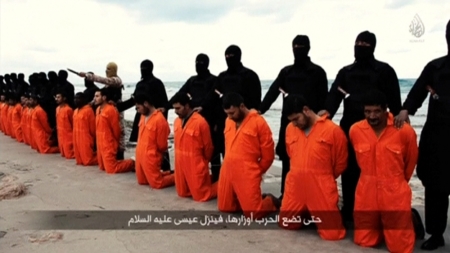Museum commemorating 21 Coptic martyrs beheaded by ISIS opens in Egypt

A Coptic martyrs museum has opened in Egypt to commemorate the 21 Christians beheaded by the Islamic State on a Libyan beach in 2015 because they refused to renounce their faith in Christ.
The world was shocked after the Islamic State released an execution video on Feb. 15, 2015, showing the decapitation of nearly two dozen migrant workers, 20 of whom were Christians from Egypt and one who was a Christian from Ghana.
The video was titled: "A Message Signed With Blood to the Nation of the Cross.”
On the fifth anniversary of that horror, Coptic Bishop Bevnotious of Samalout inaugurated a new museum that honors those killed.
According to the online magazine Cairo Scene, the new museum is housed in the Church of the Martyrs of Faith and Homeland.
The church, built in the poor village of Al-Aour in the Minya governate, opened in February 2018 on the third anniversary of the execution video’s release. The church’s construction was funded by the Egyptian government, which is led by President Abdel Fattah el-Sisi.
Al-Aour is the village where 13 of the workers killed in the video were from. The church has become a pilgrimage site for many Christians since it is the final resting place for the 21 martyrs.
The museum will include a documentary panorama that will teach viewers about how the 21 men were kidnapped and executed. The museum also features a shrine with the remains of the martyrs and the coffins that transported them from Libya to Egypt.
A Catholic press agency reports that the museum features exhibits on the victims' lives.
In addition to the museum, a memorial honoring the martyrs was also inaugurated.
The memorial features a 13-foot tall statue of Jesus Christ with His arms outstretched, open to the statues of the 21 victims kneeling before Him, seen here.
In the widely shared execution video from 2015, the victims were shown kneeling in a line before their captors right before they were beheaded. Their bodies were then thrown into a mass grave. Their bodies were later discovered by Libya’s interior ministry in 2017.
As Egypt ranks as the 16th worst country in the world when it comes to Christian persecution on Open Doors USA’s 2020 World Watch List, Coptic Christians have on many occasions faced discrimination and persecution in the Muslim-majority country.
Several attacks against Coptic Christians over the years have gained international headlines.
In May 2017, 29 Copts were killed while traveling to a desert monastery in Minya when their bus was attacked by Islamic radicals. A similar bus attack occurred near the same monastery in November 2018 in which seven were killed and at least 20 were injured.
In recent years, Copts have also been the target of deadly church bombings as well as a string of killings believed to be carried out by militants aligned with the Islamic State in Sinai.
In Al-Aour, the deaths of the martyrs have only strengthened residents’ faith. Author Martin Mosebach wrote about his visit to Al-Aour in his recent book The 21: A Journey into the Land of Coptic Martyrs.
Mosebach heard stories from family members about how the martyrs are being credited with modern-day miracles.
“These communities and congregations are very educated and know the faith,” Mosebach told The Christian Post last February. “In the spirituality of the Copts, miracles are a very important thing.”
Mosebach explained that some of the miracle stories include the martyrs being credited with saving children who fall out of windows, curing sick people and even healing a woman of infertility.
“Miracles didn’t save the [21] from decapitation but did prove that their sacrifices had made them Christlike and therefore accepted as such,” Mosebach wrote.
Throughout his presidency beginning in 2014, Sisi has made attempts to promote religious freedom, legalize churches and denounce radical extremism. However, some Christians still face punishment for their advocacy for human rights and religious freedom.
Last November, Coptic activist Rami Kamil was arrested on accusations of terror activity. Advocates said Kamil’s arrest appears to be “an effort to punish him for his work as a human rights defender.”
“In the face of huge economic, political, social and security challenges, the government of President el-Sisi seems to spare little regard for basic human rights and democratic pluralism,” a fact sheet from Open Doors USA reads.
“Thus, religious freedom for Christians is not fully guaranteed. Egyptian Christians are often victims of social exclusion and face constant discrimination in areas such as justice, education and basic social services. In rural areas, Christian women have been targeted for abduction and forced marriage.”
Follow Samuel Smith on Twitter: @IamSamSmith
or Facebook: SamuelSmithCP





















